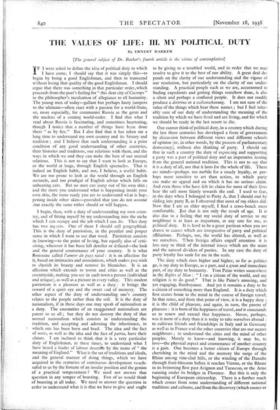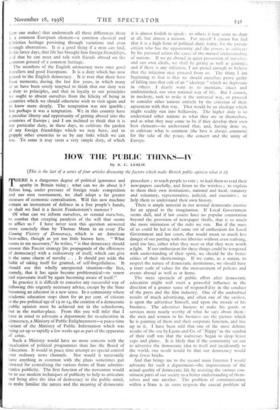THE VALUES OF LIFE : III. MY POLITICAL DUTY
By ERNEST BARKER
[The general subject of Dr. Barker's fourth article is the virtue of contemplation] IF I were asked to define the idea of political duty to which I have come, I should say that it was simply this—to begin by being a good Englishman, and then to transcend without losing that quality of the good Englishman. I should argue that there was something in that particular order, which proceeds from the poet's feeling for " this dear city of Cecrops " to the philosopher's inculcation of allegiance to all humanity. The young men of today—gallant but perhaps hasty jumpers to the ultimate—often start with a passion for a world-State, or, more especially, for communist Russia as the germ and the nucleus of a coming world-order. I find that what I read about Russia is fascinating, and sometimes heartening, though I notice that a number of things have been done there " as by fire." But I also find that it has taken me a long time to understand my own country and its history and tradition ; and I believe that such understanding is a prior condition of any good understanding of other countries, their histories and traditions, our relations with them, and the ways in which we and they can make the best of our mutual relations. This is not to say that I want to look at Europe, or the world at large, through English spectacles. That is indeed an English habit, and not, I believe, a useful habit. We are too prone to look at the world through an English monocle, and too prodigal of English advice which falls on unhearing ears. But no man can jump out of his own skin ; and the more you understand what is happening inside your own skin, the more ready you are to understand what is hap- pening inside other skins—provided that you do not assuml that exactly the same either should or will happen.
I begin, then, with a duty of understanding my own coun- try, and of fitting myself by my understanding into the niche which I can occupy and the job which I can do. That duty has two aspects. One of them I should call geographical. This is the duty of patriotism, in the peculiar and proper sense in which I want to use that word. Patriotism consists in knowing—to the point of loving, but equally also of criti- cising, wherever it has been left derelict or defaced—the look and the general countenance of your country. It is what Rousseau called l'amour du pays natal : it is an affection for it, based on intimacies and associations, which makes you wish to cherish its beauty and remove its blemishes. It is an affection which extends to towns and cities as well as the countryside, making you see in each town a person (individual and unique), as well as a picture in every valley. This modest patriotism is a pleasure as well as a duty : it brings the reward of a quiet eye and the sweet cud of memory. The other aspect of the duty of understanding one's country relates to the people rather than the soil. It is the duty of nationalism, if in these days one may speak of nationalism as a duty. The enormities of an exaggerated nationalism are patent to us all ; but they do not destroy the duty of that normal nationalism which consists in ' understanding the tradition, and accepting and adorning the inheritance, in • which. one has been born and bred. The idea and the fact of natio, as well as the idea and the fact of patria, have their claims. I am inclined to think .that it is a very particular • duty of Englishmen, in these times, to understand what I have heard a leader of labour describe by the name of " the meaning of England." What is the set of traditions and ideals, and the general manner of doing things, which we have acquired in the centuries of continuous development vouch- safed to us by the fortune of an insular position and the genius of a practical temperament ? We need not answer that question in any temper of boasting. Few of us would think of boasting, at all today. We need to answer the question in order to understand what it is that we have to give and ought to be giving to a troubled world, and in order that we may resolve to give it to the best of our ability. A great deal de- pends on the clarity of our understanding and the vigour of our resolution, but particularly on the clarity of our under- standing. A practical people such as we are, accustomed to finding expedients and getting things somehow done, is also a silent and perhaps a confused people. It does not readily produce a dottrina or a weltanschauung. I am not sure of the value of the things which bear these names ; but I feel toler- ably sure of our duty of understanding the meaning of the tradition by which we have lived and are living, and for which we should be ready in the last resort to die.
One cannot think of political duty, in a country which during the last three centuries has developed a form of government by discussion between different views and different schools of opinion (or, in other words, by the process of parliamentary democracy), without also thinking of party. I should say that in such a country the duty of espousing and supporting a party was a part of political duty and an imperative issuing from the general national tradition. This is not to say that it is a duty of all, nor that it lasts for the whole of life. There are minds—perhaps too mobile for a steady loyalty, or per- haps more sensitive to art than action, to which party can make no appeal and on which it has no serious claim. , And even those who have felt its claim for most of their lives hear the call more faintly towards the end. I used to fear, in the days when I belonged to Party A, that I should end by sliding into party B, as I observed that most of my elders did. Now that I am an elder myself, I find a cross-bench most comfortable. But that is not only the result of age. It is also due to a feeling that my social duty of service to my neighbour is at least as important, at any rate for Me," as political duty. It is hard to be a great partisan when you are drawn to causes which are irrespective of party and political affiliations. Perhaps, too, the world has altered, as well as we ourselves. When foreign affairs engulf attention. it is less easy to think of the internal issues which are the main and the natural dividers of parties. In any case the duty of party loyalty has sunk for me in the scale.
The duty which rises higher and higher, so far as politics go, is my duty to Europe, as a part, and a great and immediate part, of my duty to humanity. Tom Paine writes somewhere in the Rights of Man : " I am a citizen of the world, and my religion is to do good." That is like Paine's amusing, and yet engaging, flamboyance. And yet it remains a duty to be a citizen of something more than England. It is a duty which first comes home to the mind in the course of foreign travel. In that sense, and from that point of view, it is a happy duty ; it is the child of pleasure, and again, in turn, the parent of pleasure : it is born of the happiness of travel, and it commands us to renew and extend that happiness. Never, perhaps, was it more of a duty than it is today to take ourselves abroad : to cultivate friends and friendships in Italy and in Germany as well as in France aad the other countries that are our nearer neighbours ; to understand the cities and the mind of other peoples. Merely to know—and knowing, it may be, to love—the physical aspect and countenance of another country is a gain. One becomes a better citizen of Europe through cherishing in the mind and the memory the surge of the Rhine among vine-clad hills, or the winding of the Danube through fruit-blossom before it reaches Vienna, or the Rhone in its brimming flow past Avignon and Tarascon, or the Arno running under its bridges in Florence. But this is only the beginning of European citizenship. There is a further reach which comes from some understanding of different national traditions and cultures, and from the discovery (which sooner or later one makes) that underneath all these differences there is a common European element—a common classical and Christian heritage persisting through variations and even through aberrations. It is a good thing if a man can find, in his latter days, that life has brought him foreign friendships, a Id that he can meet and talk with friends abroad on the common ground of a common heritage.
The members of the English aristocracy were once good travellers and good Europeans. It is a duty which has now passed to the English democracy. It is true that there have been' moments, during the last few years, in which many of us have been sorely tempted to think that our duty was a duty to principles, and that in loyalty to our principles we ought to absent ourselves from the felicity of being in countries which we should otherwise wish to visit again and to know more deeply. The temptation was not ignoble ; but perhaps it was a temptation. We in this country have a peculiar liberty and opportunity of getting abroad into the countries of Europe ; and I am inclined to think that it is our particular duty, in these days, to cultivate the garden of any foreign friendships which we may have, and to grapple other countries to us by any links which we can use. To some it may seem a very simple duty, of which it is almost foolish to speak : to others it may seem no duty at all, but almost a treason. For myself I cannot but feel that it is a high form of political duty, today, for the private citizen who has the opportunity and the power, to cultivat.:. by his personal action the cause of the mutual understanding of nations. If we go abroad in quiet possession of ourselves and our own ideals, we shall be giving as well as gaining ; and if there is any infection, I am proud enough to believe that the infection may proceed from us. The thing I am beginning to fear is that we should ourselves prove guilty of falling into that cult of an " ideology " which we deprecate in others. I dearly want us to maintain, intact and undiminished, our own national way of life. But I cannot, in modesty, seek to make it the universal way, or proceed to consider other nations entirely by the criterion of their agreement with that way. That would be an ideology which might readily run into bellicosity. The higher duty is to understand other nations as what they are in themselves, and as what they may come to be if they develop their own best elements—to understand that, and, having done so, to cultivate what is common (the best is always common) for the sake of the peace, the concert and the unity of Europe.

























































 Previous page
Previous page